It’s summer time in Alaska, and I’ve been busy enjoying the season. With so many great photo shoots this summer, the ScottDickerson.com blog hasn’t been getting much attention. It’s August now and I’ve found some time to write about a photo shoot that took me out to Alaska’s Bering Sea this spring.
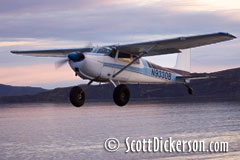 For the last three years I have been joining a fish spotter friend, Brad Heil, on a two-week adventure out to Bristol Bay in the Bering Sea. We pack our camping gear (and my photography gear) into Brad’s Cessna 175 bush plane and take off from the Homer airport heading West out across Cook Inlet, over the active volcanoes in the Alaska Range, along the shoreline of Illiamna Lake, over the twisting rivers that drain down into Bristol bay, and along the coast line to the Northwest corner of Bristol Bay. Togiak Bay, and it’s neighboring bays are our home for a couple weeks, tent-camping on the beach and spending the days flying around this wild bit of the earth.
For the last three years I have been joining a fish spotter friend, Brad Heil, on a two-week adventure out to Bristol Bay in the Bering Sea. We pack our camping gear (and my photography gear) into Brad’s Cessna 175 bush plane and take off from the Homer airport heading West out across Cook Inlet, over the active volcanoes in the Alaska Range, along the shoreline of Illiamna Lake, over the twisting rivers that drain down into Bristol bay, and along the coast line to the Northwest corner of Bristol Bay. Togiak Bay, and it’s neighboring bays are our home for a couple weeks, tent-camping on the beach and spending the days flying around this wild bit of the earth.
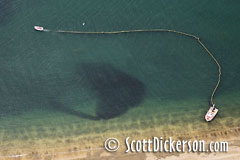 Brad’s job is to tell the fisherman where the schools of herring are and direct them when setting their nets around the fish. My job during the Togiak herring fishery is to prevent us from having a mid-air collision with other spotter planes flying in circles above the boats. But, we all know the real reason I’m there. If I have to help Brad dodge other airplanes to stay alive, I’ll do it, but mostly I’m obsessed with shooting aerial photos.
Brad’s job is to tell the fisherman where the schools of herring are and direct them when setting their nets around the fish. My job during the Togiak herring fishery is to prevent us from having a mid-air collision with other spotter planes flying in circles above the boats. But, we all know the real reason I’m there. If I have to help Brad dodge other airplanes to stay alive, I’ll do it, but mostly I’m obsessed with shooting aerial photos.
Growing up in Alaska, I spent my summers working on commercial fishing boats, and have always loved flying in small planes. So, put me in a bush plane, flying above a commercial fishery with a camera in hand . . . life is looking pretty good.
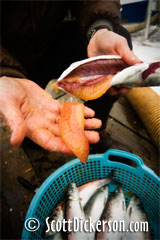 For those unfamiliar with Alaska’s commercial herring sac roe fisheries, I will try and explain the basics. In the spring millions of pacific herring come to the Togiak bay area from somewhere out in the depths of the Bering Sea. They come to spawn in the shallow waters in and around Togiak Bay which is in the Northwest edge of Bristol Bay. The female herring develop large egg sacs in their bellies prior to spawning, and some people (mostly Japanese) like to take these eggs and put them in their own bellies. This photo at left shows Brad holding an egg sac taken from a Togiak herring.
For those unfamiliar with Alaska’s commercial herring sac roe fisheries, I will try and explain the basics. In the spring millions of pacific herring come to the Togiak bay area from somewhere out in the depths of the Bering Sea. They come to spawn in the shallow waters in and around Togiak Bay which is in the Northwest edge of Bristol Bay. The female herring develop large egg sacs in their bellies prior to spawning, and some people (mostly Japanese) like to take these eggs and put them in their own bellies. This photo at left shows Brad holding an egg sac taken from a Togiak herring.
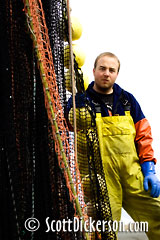 The fishermen use boats called seiners to catch the fish. The boats are named as such because they use seines (type of net). The fishermen do their best with the help of their spotter pilot to wrap their seine (net) around a school of herring. Once they have the fish in their net the tender (bigger boat with large storage capacity) sends a skiff over to scoop out a sample of the herring which are analyzed to determine the percentage of the fish that are females with ‘ripe’ roe in them. If this number is not high enough the fish processing company will not buy the fish so the fisherman must let them go.
The fishermen use boats called seiners to catch the fish. The boats are named as such because they use seines (type of net). The fishermen do their best with the help of their spotter pilot to wrap their seine (net) around a school of herring. Once they have the fish in their net the tender (bigger boat with large storage capacity) sends a skiff over to scoop out a sample of the herring which are analyzed to determine the percentage of the fish that are females with ‘ripe’ roe in them. If this number is not high enough the fish processing company will not buy the fish so the fisherman must let them go. 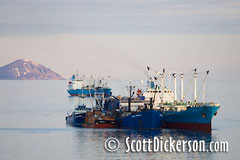 If the percentage is good then the tender boat comes alongside the fishing boat and uses a pump to move the fish from the net into big refrigerated water tanks on the tender. A good set in the Togiak fishery can be as big as 800,000lbs of herring. The fish are chilled on board the tender as they are taken to a floating processor where the roe is extracted, packaged, and frozen before being loaded ontos very larger tramper vessel that will deliver the roe to markets in Japan.
If the percentage is good then the tender boat comes alongside the fishing boat and uses a pump to move the fish from the net into big refrigerated water tanks on the tender. A good set in the Togiak fishery can be as big as 800,000lbs of herring. The fish are chilled on board the tender as they are taken to a floating processor where the roe is extracted, packaged, and frozen before being loaded ontos very larger tramper vessel that will deliver the roe to markets in Japan.
I could go on for pages about this fishery and the adventures I’ve had with Brad out there on the Bering Sea, so if you want to know more ask in the comments and I’ll be happy to share. If you want to read more about commercial fishing see my blog post after I photographed the Sitka sac roe fishery
Click here to see a photo gallery with some of my favorites from the commercial fishery.

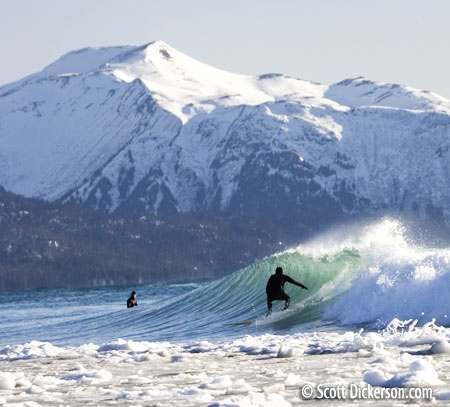
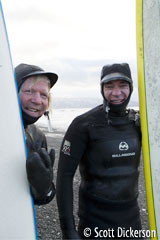 One of the best things about surfing in Alaska is the great spirit out on the water. Some would say it’s because misery loves company. Whatever it is, we make quick friendships sitting out there in the water, freezing together as we wait for that perfect swell. It might be just because there are so few of us that we band together due to a preservation instinct. I think there is also an element that comes when you are in the water shaking with hypothermia, you definitely hope that anyone around is your friend, and will help you get out of your wetsuit if you are too cold to open the zipper yourself. We still call each other when the waves are firing, and try desperately to get at least one other person to share the experience with us. I must say though, I’ve heard rumors of crowds in one surfing spot in southeast Alaska.
One of the best things about surfing in Alaska is the great spirit out on the water. Some would say it’s because misery loves company. Whatever it is, we make quick friendships sitting out there in the water, freezing together as we wait for that perfect swell. It might be just because there are so few of us that we band together due to a preservation instinct. I think there is also an element that comes when you are in the water shaking with hypothermia, you definitely hope that anyone around is your friend, and will help you get out of your wetsuit if you are too cold to open the zipper yourself. We still call each other when the waves are firing, and try desperately to get at least one other person to share the experience with us. I must say though, I’ve heard rumors of crowds in one surfing spot in southeast Alaska.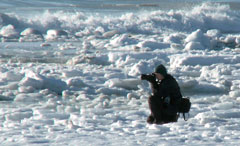 For a few winters I’ve been throwing the camera in the car on my way to the beach, and until last winter that’s mostly where it stayed. It’s difficult to surf and photograph on the same trip to the beach. If I go surfing first, then my hands are numb, my body shaking, and the only thing on my mind is a hot shower. If I photograph first, then I get too cold standing on the beach and the last thing I want to do when I’m that cold is jump in the water. So needless to say, a lot of amazing surf sessions passed undocumented. This last winter though, I just couldn’t stand it anymore. I was finding myself out in the water on picture perfect days wishing I was on the beach with the camera. It can just be so overwhelmingly dramatic surfing here sometimes that I had to do something about it. So this winter I started leaving the surfboard on the car and just photographing. I think it paid off, though I missed some great waves, I’ve got photos to show how nice they were. And I’ve got some happy surfing buddies. Sure they missed my company in the water, but nobody minds seeing a photo of themselves getting barreled outside the ice pack with snow covered mountains in the background. (Thanks to Donna Rae Faulkner for the photo of me photographing surfers on the icy beach)
For a few winters I’ve been throwing the camera in the car on my way to the beach, and until last winter that’s mostly where it stayed. It’s difficult to surf and photograph on the same trip to the beach. If I go surfing first, then my hands are numb, my body shaking, and the only thing on my mind is a hot shower. If I photograph first, then I get too cold standing on the beach and the last thing I want to do when I’m that cold is jump in the water. So needless to say, a lot of amazing surf sessions passed undocumented. This last winter though, I just couldn’t stand it anymore. I was finding myself out in the water on picture perfect days wishing I was on the beach with the camera. It can just be so overwhelmingly dramatic surfing here sometimes that I had to do something about it. So this winter I started leaving the surfboard on the car and just photographing. I think it paid off, though I missed some great waves, I’ve got photos to show how nice they were. And I’ve got some happy surfing buddies. Sure they missed my company in the water, but nobody minds seeing a photo of themselves getting barreled outside the ice pack with snow covered mountains in the background. (Thanks to Donna Rae Faulkner for the photo of me photographing surfers on the icy beach)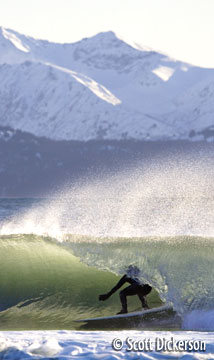 This last winter offered some great surfing photo opportunities with lot’s of ice on the beaches and some really nice waves. I spent most of the best surf days standing on the beach bundled up wearing a fur hat with holding frozen cameras. These photo shoots are not particularly technically challenging, it is mostly about being there at the right time and knowing the subject. The photographic challenges mostly involve keeping the cameras warm enough to operate and having enough batteries to make it through a good session. Mostly when I’m photographing surfing in Alaska I try to focus on what makes this special. People are surfing gorgeous green waves the world-round, so what makes Alaska so special? I try and show those elements that make surfing in Alaska unique – ice, snow covered mountains, snowy beaches, uncrowded breaks . . .
This last winter offered some great surfing photo opportunities with lot’s of ice on the beaches and some really nice waves. I spent most of the best surf days standing on the beach bundled up wearing a fur hat with holding frozen cameras. These photo shoots are not particularly technically challenging, it is mostly about being there at the right time and knowing the subject. The photographic challenges mostly involve keeping the cameras warm enough to operate and having enough batteries to make it through a good session. Mostly when I’m photographing surfing in Alaska I try to focus on what makes this special. People are surfing gorgeous green waves the world-round, so what makes Alaska so special? I try and show those elements that make surfing in Alaska unique – ice, snow covered mountains, snowy beaches, uncrowded breaks . . .
 The day of the third opening, Ken Jones allowed me to ride along on his boat, F/V Agave, for a couple test fishing sets in the morning. A sample of the fish caught were analyzed by Fish and Game to determine the ‘maturity’ of the eggs in the female herring. Shortly after the test sets were finished it was announced that there would be a fishery that day. Tom Stafford, captain of the F/V Infinite Glory, let me spend the opener on his boat photographing from up in the rigging and running around on deck.
The day of the third opening, Ken Jones allowed me to ride along on his boat, F/V Agave, for a couple test fishing sets in the morning. A sample of the fish caught were analyzed by Fish and Game to determine the ‘maturity’ of the eggs in the female herring. Shortly after the test sets were finished it was announced that there would be a fishery that day. Tom Stafford, captain of the F/V Infinite Glory, let me spend the opener on his boat photographing from up in the rigging and running around on deck. This is my first trip report, shoot report, adventure story, not sure what to call these. Please let me know if there is anything in particular you want to hear about.
This is my first trip report, shoot report, adventure story, not sure what to call these. Please let me know if there is anything in particular you want to hear about. Saturday morning Anders Gustafson and I drove the 4 hours up to Turnagain Arm and met Brian and Heather Schenck (owners of Windzup) and one of their team riders – James Brown. Also there was John, owner of
Saturday morning Anders Gustafson and I drove the 4 hours up to Turnagain Arm and met Brian and Heather Schenck (owners of Windzup) and one of their team riders – James Brown. Also there was John, owner of  The snow kept up until about the last half hour of action which enabled me to shoot a few photos in some sweet winter afternoon light. I was alternating between wide-angle and telephoto lenses, keeping both the 5D and the 1DMII hung around my neck. Especially in conditions like those on Saturday it’s very nice to have two camera bodies going so there is less need to change lenses and potentially get snow blown into the camera.
The snow kept up until about the last half hour of action which enabled me to shoot a few photos in some sweet winter afternoon light. I was alternating between wide-angle and telephoto lenses, keeping both the 5D and the 1DMII hung around my neck. Especially in conditions like those on Saturday it’s very nice to have two camera bodies going so there is less need to change lenses and potentially get snow blown into the camera. Once again I was a spoiled photographer with James doing whatever I asked, and a lot of things I wouldn’t even think to ask for. I also shot photos of an avid kiter Tom who when asked where he was from said “I’m from Oregon, but I moved to Alaska this fall to snowkite.” After photographing him flying out over the lake some 20 times I believe him. I asked for some tips on flying with kite and he explained that learning to control the kite when you are flying backwards is key, that, and not looking down.
Once again I was a spoiled photographer with James doing whatever I asked, and a lot of things I wouldn’t even think to ask for. I also shot photos of an avid kiter Tom who when asked where he was from said “I’m from Oregon, but I moved to Alaska this fall to snowkite.” After photographing him flying out over the lake some 20 times I believe him. I asked for some tips on flying with kite and he explained that learning to control the kite when you are flying backwards is key, that, and not looking down.